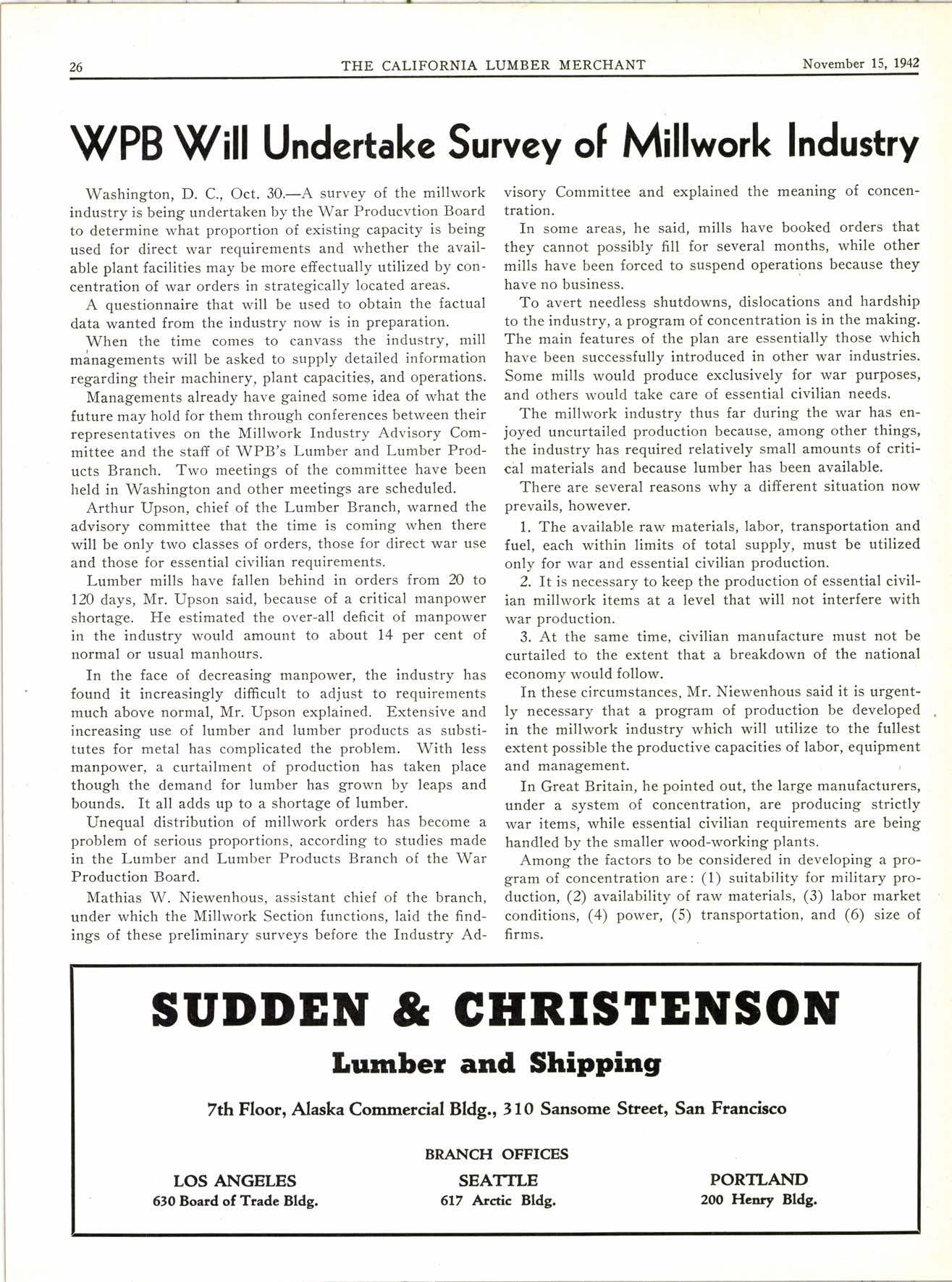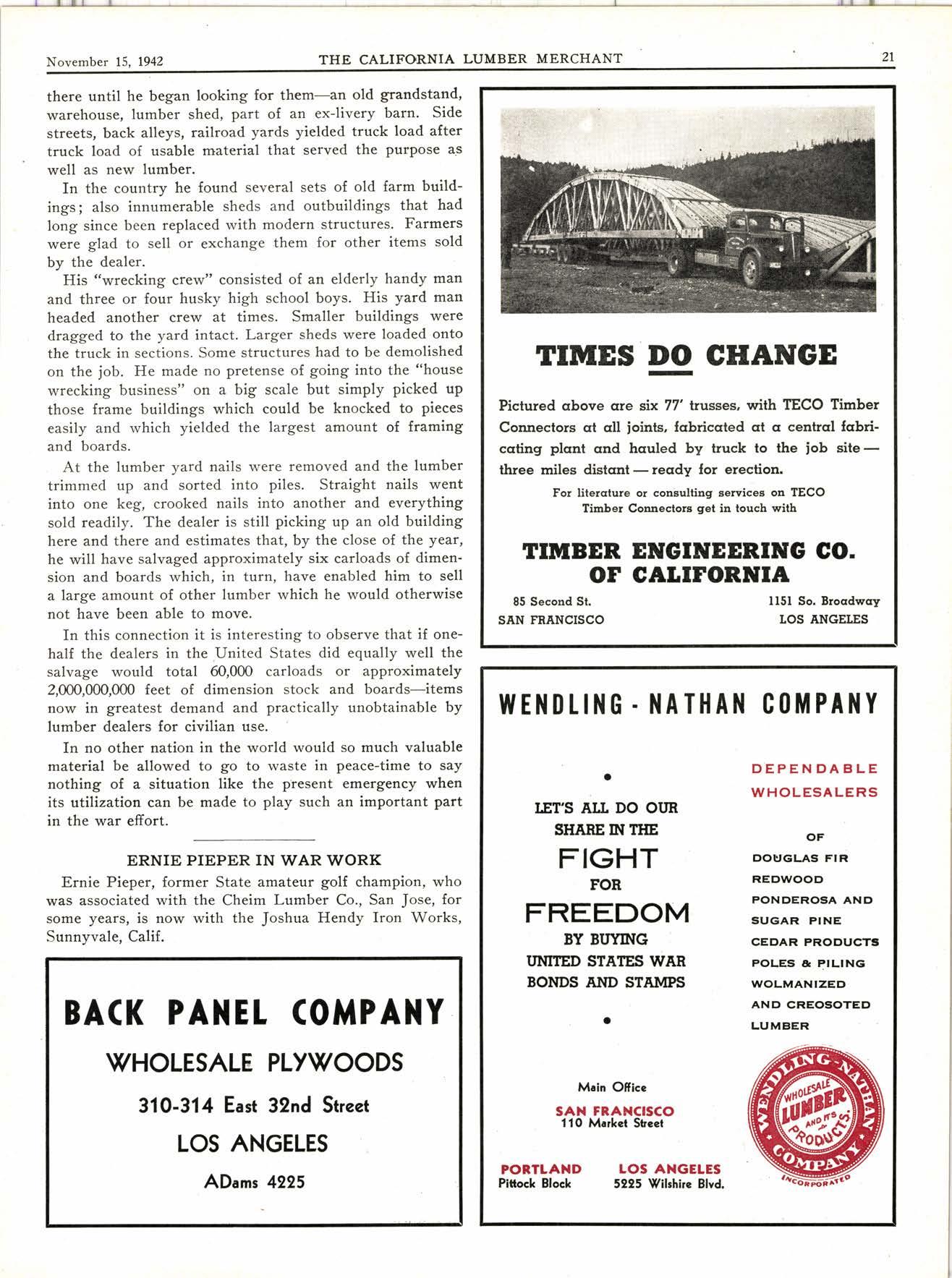
5 minute read
OLLII\G L
It tcrkes cr lot ol effort and work to stcrrt cr log rolling. Once it gets going, however, it's hcrrd to stop. A log, like crny business, requires c little extra push when it starts to slow down. We're looking lonncrrd to the time when our business slcrckens oII crnd you will be the only one who can keep it rolling. Thqt's why we cre suggesting thcrt on homes clrecdy built "IEMPERATttRE CONDHONING" with PALCO WOOL Insulcrtion offers cr mcrket thct will help you over this present *hump"-cnd keep you rolling on the down-hill pull.
Write us lor detcils, todcry.
Lincoln said: "The occasion is piled high with difficulty, and we must rise with the occasion. Fellow citizens, we cannot escape history."
Goethe said: "That which the fathers have bequeathed to thee, earn it anew if thou wouldst possess it.', {<**
Genesis says (Chap. 11, verses 7 and 9) : ',Let.us go down and then confound their language, that they may not understand one another's speech. * * 'F Therefore is the name of it cdled Babel."
{. rl. :f
A Canadian lumber journal now before me prints the building restrictions of that nation. It takes only the fewest minutes to read them, and once read a twelve-year-old school boy will have no difficulty in understanding exactly what they mean.
***
Turning homeward from those simple, direct, and uriconfusing regulations of a nation that is fully as much at war as this one is, reminded me of the above quotation from Scripture. The countless words and phrases that have been issued to the lumber industry of the United States to make up all the rules, regulations, restrictions, amendments covering their business might well be called "Babel.', Surely the descendants of Noah could not have been more confused with strange words than the lumber folks of this country have been for the past year.
**:N(
The difference is that in Genesis the Lord deliberately confounded the language of the people of the earth, while today our officials who send forth the torrent of rules and still more rules, have, f feel sure, no such intention. But unfortunateln the result is somewhat the same in both cases. Their formula would seem to be, never use one word when you can possibly squeeze in a score or more.
***
The lumber industry has no Elmer Dpvis appointed to reduce the redundancy. Mr. Davis has killed off more than 300 separate and distinct publications that the various bureaus at Washington had been sending out, that being one of the big jobs for which he was appointed. But the building industry keeps struggling willingly and manfully to discover the why and wherefore of the high tide of regulatory and restrictive literature that keeps right on coming. ***
The average lumber dealer is confused, not only as to the meaning of the red tape that surrounds the lumber and building regulations, but he wonders also if all these restrictions are necessary; if they are wise from the standpoint of helping win the war? ***
In the current issue of Colliers I read a statement of Under Secretary of Commerce, \ll/ayne C. Wright, to the efrect that, unless something very practical and helpful is dorie about it, not less than 300,000 small businesses will disappear before another year is past. And it is factual to add to that statement that a whale of a lot of that number will be retail lumber deal€rs. No doubt about it. If the trend of today and the past six months continues, lumber yards are going to disappear in droves.
!F*!F
Now I doubt if there is anywhere in this nation a more loyal and patriotic set of men than the retail lumber dealers. If their Government, after thoughtful and practical consideration of the facts said fe ffug6-..all lumber yards must close for the duration of the war," it would be done, promptly, without griping, and with the same sort of patriotic fervor with which their sons in such great nurnbers have shouldered their rifles and gone forth to war. It would, and you can bet on it. Any other sacrifices that are found to be vital to the winning of the war, they will make willingty and cheerfully'
But they cannot help wondering if their elimination IS essential to the war effort. On the contrary, they are wondering in their honest hearts if it would not be a national calamity if the lumber yards were to close in wholesale fashion? Would not such a development be actually hurtful to the all-out effort to win the war? The three fundamental essentials of hurnan life are food, shelter, and clothing. To the man in the street, the retail lumber dealer in his town represents shelter. He does not, when his roof leaks, when his porch sags, when his fence rots, when his barn cries aloud for repairs, turn to the architect, the contractor, or anyone else. He turns to the lumber dealer for his material, his advice, and the service that goes with the needed job.

To keep our people decently housed and their'shelter in proper order, is just as big a job in war times as in peace times. Perhaps much larger, because the prohibition (and very proper) against new buildings that are not entirely essential to the war effort, makes it all the more important to keep our present buildings in sound condition. Buildings are like men. They require frequent repair and up'keep' They require patching, strengthening, protecting. Not a day passes but hundreds of thousands of buildings in this country turn up sick, just as millions of humans do. And something needs to be done about it. No doubt thousands of these cases could be allowed to run their course until after the war, if to do so would help win the war. But will it? ***
Step by step, inch by inch, week by week, the new building rules and restrictions keep on reducing the amount, and kind, and character of business that the lumber dealer may do. It is a pincers movement that keeps goose pimplds on Mr. Dealer's back, and makes him wake at night in a cold sweat. He has a well working thinking apparatus, and, while no doubt there is some bias in his opinion, he feels that a general closing of the lumber yards would be a calamity second only to the general closing of food stores, so far as our economic situation and internal workings are concerned. He believes that if the thing is wisely and practically handled, enough corners can be cut, enough material not essential to the war effort can be used, and enough manpower that has nowhere else to go can be kept busy, to allow the active and useful lumber dealer to stay in business, give his territory the retail service it vitally needs, and preserve the skeleton of his business in readiness for after-the-war usefulness. *** rf**
So far as manpower is concerned, it must be kept well in mind that every man who handles the hammer and saw, the paint brush, etc., is not necessarily either soldier or war plant material. In every town there are scores of such men who are not fit to carry a gun or work in a shipyard or ordnance plant. Some of the discussions of employing our manpower remind me of the fellow who asked the butcher why he did not cut ALL of his beef into porterhouse steaks? But they are capable of fixing, repairing, repainting, papering, roofing, and doing the thousands of odd jobs of building that are being called for wherever man and his possessions are housed.
The present huge demand for Government lumber will not last forever. And when it comes to a close, the lu,mber dealers of the nation will be needed more than ever before to commence the work of post-wap building. When World War One ended, immediately there arose a tremendous tide

(Continued on Page 8)










